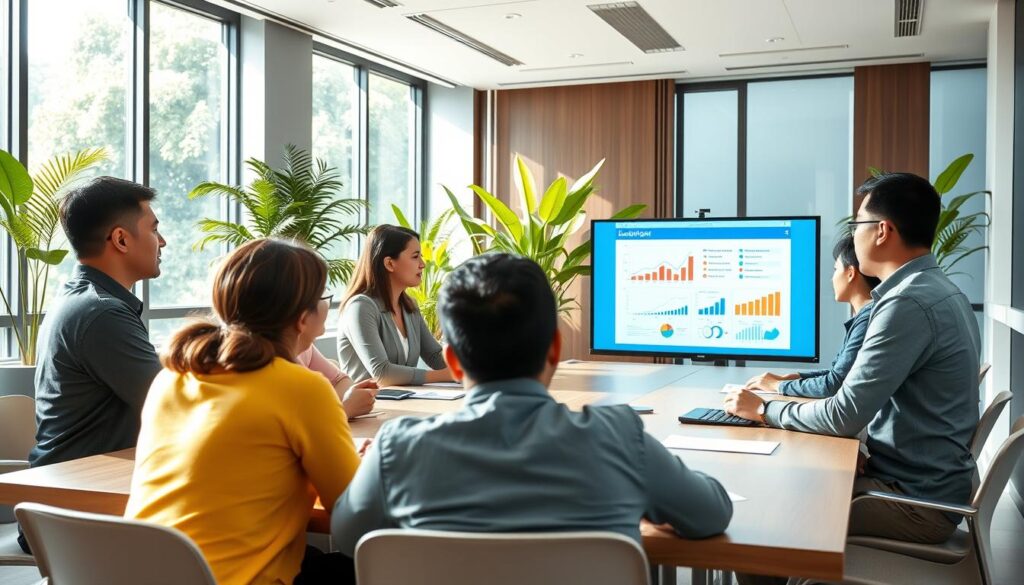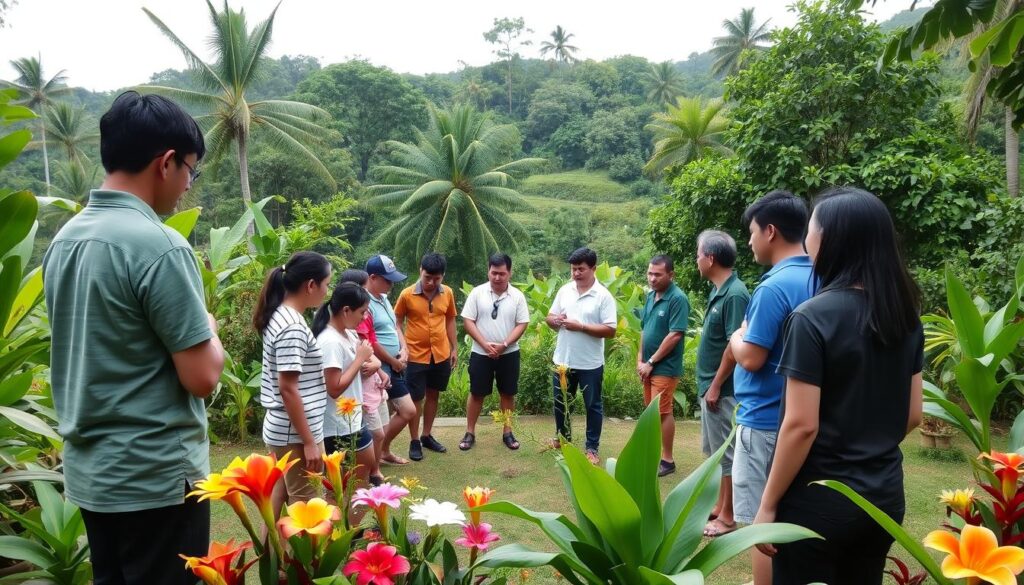Ever wondered why some teams excel while others lag behind? The secret often lies in effective leadership training. In the Philippines, the business world is changing fast. This change highlights the need for better leadership skills, especially for small and medium enterprises (SMEs).
Leadership training is more than just a trend. It’s a key strategy that helps teams overcome challenges. With the right management courses, teams can work better together. This improves their performance and boosts the success of the whole organization.
Key Takeaways
- Understanding the critical role of leadership training in team success.
- The unique challenges faced by SMEs in the Philippines and how to address them.
- Importance of tailored management courses to meet specific organizational needs.
- How leadership training enhances team dynamics and fosters collaboration.
- Transformative potential of effective leadership skills training for business growth.
Understanding the Importance of Leadership Training
Leadership training is key to building strong teams in companies. It helps teams learn important skills for working together and coming up with new ideas. This growth is crucial for reaching business goals.
Why Leadership Training Matters for Teams
Good leadership changes how teams work together. Trained leaders make their teams happier, more responsible, and welcoming. They learn to motivate their teams, creating a culture of teamwork and respect.
This environment helps teams do their best, especially in today’s fast business world.
The Impact of Leadership on Organizational Success
Leadership is closely linked to a company’s success. Studies show that companies that invest in training do better. They keep their employees longer and make more money.
Leadership training boosts individual skills and strengthens the company. It helps businesses face challenges and find new chances in a changing market.

Leadership Training Philippines: An Overview
In the Philippines, leadership training programs are diverse and aimed at creating effective leaders. These programs mix theory with practical skills. This way, participants learn to handle complex work situations.
Interactive learning, ongoing support, and real-world examples are key. These features make the training valuable and applicable.
Key Features of Leadership Training Programs
Effective leadership training programs have important elements. They cater to different learning needs. Key features include:
- Interactive Learning: Sessions that use discussions, simulations, and group activities.
- Practical Application: Focuses on real-life scenarios and case studies.
- Continuous Support: Offers ongoing coaching and mentoring.
- Customized Content: Materials tailored to specific needs of organizations and individuals.
Types of Leadership Training Available in the Philippines
The Philippines offers various leadership training types. They suit different professional levels and business settings. Common formats include:
| Type of Training | Description | Target Audience |
|---|---|---|
| Foundational Leadership Courses | Introduction to basic leadership concepts and skills. | New managers and team leaders. |
| Advanced Leadership Programs | In-depth training for experienced leaders focusing on strategic decision-making. | Senior executives and executives in positions of influence. |
| Management Courses | Courses designed to enhance managerial skills and competencies. | All levels of management. |
Choosing the right leadership training providers is crucial. Organizations like the Development Academy of the Philippines and MDI Novare are excellent choices. Quality training leads to better leadership and organizational success. For more on improving team dynamics, see this resource on boosting sales performance.
“Unleashing Your Inner Leadership”, a Leadership Training Course by Jeff Chua
If you aspire to create meaningful legacy in your career and beyond, and you’re ready to uncover and activate you’re inner leader, then Jeff Chua’s “Unleashing Your Inner Leadership” is the course for you.
This training delves deep into the essence of authentic leadership by combining timeless wisdom with modern insights. Mr. Chua’s engaging approach, paired with practical exercises, empowers you to recognize and harness your unique leadership qualities. Through compelling stories, reflections, and actionable strategies, this course equips you to craft a vision for your leadership legacy, ensuring a profound impact on your organization and the people you lead.

Leadership Development Programs for SMEs
Leadership development programs are key for small and medium enterprises (SMEs) in the Philippines. They help improve management skills. By making these programs fit SMEs’ needs, they work better and meet business goals.
These tailored programs help grow future leaders. They give them the skills to face challenges and find new opportunities.
Tailoring Programs to Fit Small and Medium Enterprises
Effective leadership training in the Philippines needs to understand SMEs’ unique situations. Here are ways to tailor programs:
- Needs Assessment: Find out what skills are missing and where to improve.
- Flexible Formats: Provide both in-person and online options for busy schedules.
- Targeted Content: Use training sessions for real-world scenarios that SMEs face.
- Stage-Specific Learning: Offer modules for both new and experienced leaders.

Interactive and Practical Leadership Training Modules
Building effective leadership skills is more than just knowing theory. Interactive and practical training modules get participants involved in real learning. This hands-on approach helps them understand and apply key concepts better. Corporate workshops based on this model focus on active participation, making sure skills can be used immediately in real situations.
Key Learning Outcomes in Training Modules
Leadership training programs aim to improve personal and professional growth. Some key outcomes include:
- Developing emotional intelligence: Understanding and managing emotions leads to better workplace relationships.
- Managing stress: Learning to cope with work pressures improves decision-making.
- Enhancing communication skills: Clear communication boosts teamwork and leadership.
Importance of Engagement and Retention in Learning
Engagement in training is key for retaining information. When participants actively take part in discussions and exercises, they learn better. Using real-life scenarios in management courses helps learners connect what they learn to their jobs. High engagement leads to lasting motivation and better leadership skills.

The Role of Executive Coaching in Leadership Training
Executive coaching is key in boosting leadership skills. It goes beyond the usual training methods. This approach focuses on personal growth, leading to better results for leaders.
Differences Between Coaching and Traditional Training
Executive coaching and traditional training differ in their impact on leadership. Coaching is about one-on-one sessions that target personal goals and challenges. It helps leaders create action plans tailored to them.
On the other hand, traditional training uses a standard curriculum for everyone. It focuses on group learning without considering individual needs.
- Executive Coaching: Focused on individual growth objectives
- Traditional Training: Standardized content delivery
Benefits of Executive Coaching for Filipino Leaders
Filipino leaders gain a lot from executive coaching. One big benefit is increased self-awareness. This helps them understand their strengths and weaknesses better.
They also get customized feedback and development plans. This leads to personal growth and faster skill improvement.
Now, local programs are adding executive coaching to their offerings. These programs help Filipino managers meet their goals and overcome challenges.
| Aspect | Executive Coaching | Traditional Training |
|---|---|---|
| Focus | Individualized Approach | Group Curriculum |
| Duration | Flexible and Ongoing | Scheduled Sessions |
| Feedback | Immediate and Personalized | Generalized Evaluation |
| Goals | Tailored Development Plans | Standardized Objectives |
Corporate Training Workshops to Enhance Leadership Skills
Corporate training workshops are key in boosting leadership skills in companies. They offer an interactive space for hands-on learning. This way, leaders can develop the skills needed to lead their teams well. In the Philippines, leadership training has shifted to focus on workshops that meet specific company goals.
Design and Implementation of Corporate Workshops
Success in corporate training depends on careful planning and execution. First, a detailed needs assessment helps pinpoint the leadership skills needed. This guides the creation of content that matches the company’s challenges.
- Real-life case studies make training more relatable
- Collaborative exercises boost peer interaction
- Regular feedback and assessments check understanding
- Curriculum updates keep training current with industry trends
Effective workshops also rely on skilled facilitators who inspire and motivate. These experts mix teaching methods to keep the training lively. They include team building activities to build team spirit.
Building High-Performance Teams through Workshops
Workshops on leadership skills are crucial for creating top teams. They include team building to improve trust and communication. This lets leaders practice their skills in a supportive setting.
Successful workshops have:
| Workshop Element | Description | Outcome |
|---|---|---|
| Interactive Learning | Engaging participants through discussions and role-plays | Improved retention of leadership principles |
| Action Planning | Developing personalized action steps post-training | Clear roadmap for application in the workplace |
| Follow-Up Sessions | Scheduled check-ins to reinforce learning | Enhanced commitment to leadership development |
In the Philippines, companies see the value in leadership training. Tailored workshops are a key investment in developing leaders who can handle complex team challenges.
Incorporating Team Building Activities in Leadership Training
Team building activities are key to improving leadership in organizations. They help teams communicate better, build stronger relationships, and trust each other more. This teamwork is crucial for good leadership and boosts team performance.
Importance of Team Building in Leadership Development
Team building is very important for leadership growth. It makes people feel part of a team and loyal. It helps leaders motivate and inspire their teams, leading to better work and happier people.
These activities give new leaders hands-on experience. They learn how to solve problems, make decisions, and work together.
Examples of Effective Team Building Activities
Many Philippine companies use team building in their leadership training. Here are some examples:
- Outdoor Adventure Challenges: Trekking or obstacle courses help teams work together and solve problems in a fun way.
- Workshops with Role-Playing: Simulated scenarios let people practice leadership skills in a safe space, getting feedback.
- Community Service Projects: Helping out in the community builds purpose and strengthens team bonds.
Adding these activities to leadership training improves teamwork and creates a collaborative culture. This is key for any organization looking to succeed.
Choosing Leadership Training Providers in the Philippines
Choosing the right leadership training provider in the Philippines is important. A good provider can make your training program much better. SMEs should look at the training methods, the provider’s reputation, support services, and feedback from others.
These factors help ensure the provider meets your organization’s needs.
Criteria for Selecting the Right Training Provider
Here are key things to consider when choosing a provider:
- Training Methodologies: Choose providers that use interactive and relevant methods.
- Industry Reputation: Check the provider’s history and recognition in leadership and management training.
- Support Services: See if they offer extra help or resources after the training.
- Participant Feedback: Read what others say about their experiences to gauge the training’s effectiveness.
Top Leadership Training Providers in the Philippines
Several top providers stand out in the Philippines. Here are a few:
| Provider Name | Focus Areas | Type of Courses |
|---|---|---|
| DAP (Development Academy of the Philippines) | Public Service Leadership | Leadership Seminars, Management Courses |
| MDI Novare | Corporate Leadership Development | Customized Training Programs |
| PAL (Philippine Airlines) Leadership Academy | Aviation and Hospitality Management | Workshops, Seminars |
Conclusion
In today’s fast-changing business world, leadership training in the Philippines is key. It boosts how well a company works and makes employees happier. Companies that focus on good leadership training are preparing for the future.
Small and medium businesses can really gain from special training workshops. These help them grow and work better together. This is crucial for success in the Philippines’ business world.
By choosing to invest in leadership training, companies can unlock their team’s full potential. They will not only work better together but also stand out in the market. The first step to better leadership is to start training.
